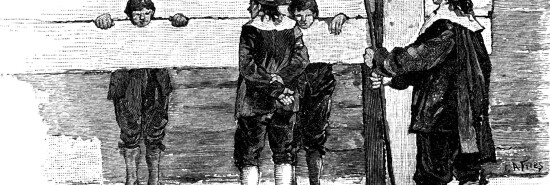
Why the Puritans outlawed Christmas, and why it matters today
Scott Gerber
Video Embed
The Puritans were English Protestants in the 16th and 17th centuries who sought to “purify” the Church of England of remnants of the Roman Catholic “popery” that the Puritans claimed had been retained after the religious settlement reached early in the reign of Queen Elizabeth I.
When the Puritans came to power in England, Parliament enacted a law in 1647 abolishing the observance of Christmas, Easter, and Whitsuntide.
STIMULUS UPDATE: ONE-TIME CHRISTMAS BONUS CHECK WORTH $600 BEING SENT OUT TO WORKERS FRIDAY
In 1620, the Pilgrims of Plymouth Colony in what is today the Commonwealth of Massachusetts in the United States of America fled England as Separatists: they denied the validity of the Church of England and wished to practice their faith in their own way. They believed that the English government’s failure to fully purge the Church of England of Catholic ritual and practice was a sign of corruption that made it impossible to find salvation within that church. The Puritans, in contrast, immigrated to Massachusetts Bay Colony in 1630 as members of the Church of England who desired to reform, rather than abandon, the church. Connecticut — initially, the separate River and New Haven colonies — was planted by Puritans who did not consider Massachusetts Bay pious enough.
On the first Dec. 25 of the Pilgrims’ sojourn to English America, they went into the fields on Christmas and worked as if it were any other day. Gov. William Bradford recorded in his famous journal that the next year members of a “new company excused themselves and said it went against their consciences to work on that day.” The governor warned them that “it was against his conscience that they should play & others work.” After that, Bradford reported, “nothing hath been attempted that way, at least not openly.” Plymouth Colony’s Christmas ban was therefore implemented by what present-day legal historians would characterize as a “legality”: a “law” produced outside of a formal governmental setting that was generated from a widely-accepted repetitive social practice.
In 1659, the government of Massachusetts Bay decreed it to be a criminal offense to publicly celebrate Christmas. The Puritans believed there was no Scriptural basis for the celebration and declared that “whosoever shall be found observing any such day as Christmas or the like, either by forbearing of labour, feasting, or any other way” was subject to a five-shilling fine. The anti-Christmas law was repealed in 1681. The Puritans nevertheless continued their opposition. For example, in 1706, a Puritan mob smashed the windows of King’s Chapel in Boston as Anglicans held a Christmas service there.
Christmas was likewise banned in Puritan Connecticut in 1659, which meant that making mince pies, playing cards, performing on musical instruments, and the like were prohibited. The Puritans conceived of Christianity as a package that encompassed moral righteousness or rules about morality, some of them drawn specifically from the Hebrew Bible, others part of a wider, religious commitment to social discipline. They used law to enforce this view.
In the immortal words of Charlie Brown in A Charlie Brown Christmas, “Isn’t there anyone who knows what Christmas is all about?”
Linus knew. In almost certainly the most beautiful scene of any Christmas TV special — a scene the network wanted Charles M. Schultz to delete — Linus reminds Charlie Brown that Christmas is about the birth of the Savior, “which is Christ the Lord.”
Significantly, Charlie Brown’s question about the meaning of Christmas was prompted by the sadness he felt despite the onset of the holiday season. Linus concluded his answer to his friend’s heartfelt question by quoting Luke 2:12-14:
CLICK HERE TO READ MORE FROM THE WASHINGTON EXAMINER
“And this shall be a sign unto you; Ye shall find the babe wrapped in swaddling clothes, lying in a manger. And suddenly there was with the angel a multitude of the heavenly host praising God, and saying, ‘Glory to God in the highest, and on earth peace, good will toward men.’”
In today’s times of needless intolerance, unkindness, and selfishness, it is wise to remember the true meaning of Christmas.
Scott Douglas Gerber is a law professor at Ohio Northern University and an associated scholar at Brown University’s Political Theory Project. His tenth book, “Law and Religion in Colonial America: The Dissenting Colonies,” will be published by Cambridge University Press in 2023.
